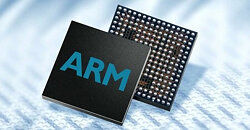Friday, August 21st 2020

Arm and DARPA Sign Partnership Agreement to Accelerate Technological Innovation
Arm today announced a three-year partnership agreement with the U.S. Defense Advanced Research Projects Agency (DARPA), establishing an access framework to all commercially available Arm technology. With DARPA's Electronics Resurgence Initiative gaining momentum, the new agreement will enable the research community that supports DARPA's programs to quickly and easily take advantage of Arm's leading IP, tools and support, accelerating innovation in a variety of fields.
"The span of DARPA research activity opens up a huge range of opportunities for future technological innovation," said Rene Haas, president, IP Products Group, Arm. "Our expanded DARPA partnership will provide them with access to the broadest range of Arm technology to develop compute solutions supported by the world's largest ecosystem of tools, services and software."With more than 170 billion Arm-based chips shipped to date, Arm offers the industry's most proven IP, providing distributed intelligence from cloud to edge and endpoint. The expanded partnership enables DARPA researchers to have the flexibility and scalability to access vertical market compute from small embedded sensors to high-performance systems.
"DARPA's programs within the Microsystems Technology Office (MTO) focus on the most advanced challenges in microelectronics; equipping our community with best in class technologies is essential not only for break-through scientific and engineering advances, but also for improved transition into military and commercial applications," stated Serge Leef, who leads design automation and secure hardware programs in MTO.
To support the work DARPA does, multidimensional collaboration is key. An Arm IP license gives the DARPA community a portal to the world's largest open compute ecosystem of silicon designers and software developers, enabling the lowest SoC build costs and smallest risk profile. Projects can transition from concepts to real-world deployments in a fast and efficient way, with guidance on everything from hardware verification to physical implementation and software development.
"The span of DARPA research activity opens up a huge range of opportunities for future technological innovation," said Rene Haas, president, IP Products Group, Arm. "Our expanded DARPA partnership will provide them with access to the broadest range of Arm technology to develop compute solutions supported by the world's largest ecosystem of tools, services and software."With more than 170 billion Arm-based chips shipped to date, Arm offers the industry's most proven IP, providing distributed intelligence from cloud to edge and endpoint. The expanded partnership enables DARPA researchers to have the flexibility and scalability to access vertical market compute from small embedded sensors to high-performance systems.
"DARPA's programs within the Microsystems Technology Office (MTO) focus on the most advanced challenges in microelectronics; equipping our community with best in class technologies is essential not only for break-through scientific and engineering advances, but also for improved transition into military and commercial applications," stated Serge Leef, who leads design automation and secure hardware programs in MTO.
To support the work DARPA does, multidimensional collaboration is key. An Arm IP license gives the DARPA community a portal to the world's largest open compute ecosystem of silicon designers and software developers, enabling the lowest SoC build costs and smallest risk profile. Projects can transition from concepts to real-world deployments in a fast and efficient way, with guidance on everything from hardware verification to physical implementation and software development.

12 Comments on Arm and DARPA Sign Partnership Agreement to Accelerate Technological Innovation
This is no coincidence. IP is now getting effectively secured, I think in more ways than one. It'll be interesting to see the counterpunch...
Lost.
/tinhat on
DARPA leakers have tried to show that DARPA was holding onto technolgy break thru's decades ago. Stuff that was reversed engineered since the crach of 1947 and acquired from other countries. I'd like to know which side pushed for this agreement, since it could be about hindering new advanced technology, They dont want Star Trek technology (or Stargate) getting out.
/tinhat off
:rolleyes: :p :eek::kookoo::kookoo::kookoo::kookoo: